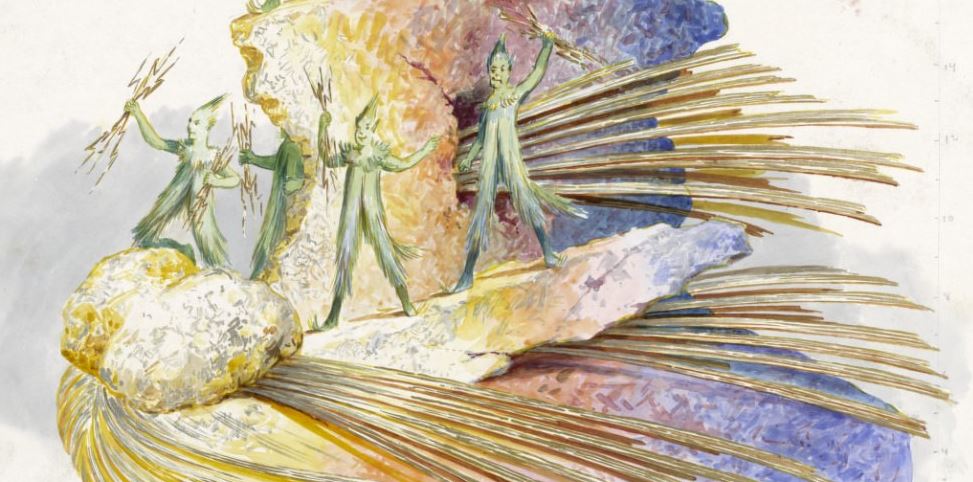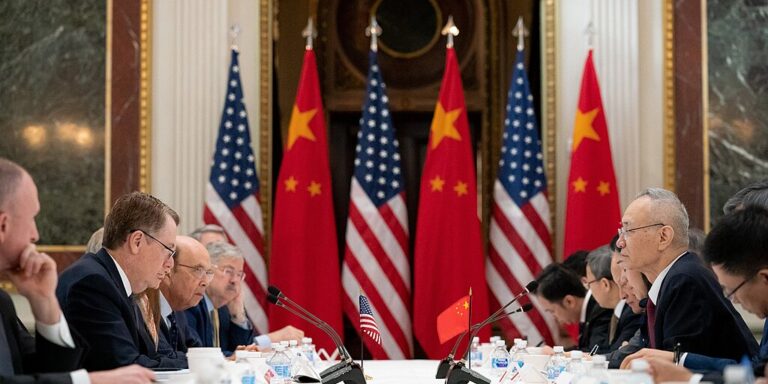
For Americans to understand British politics as it is practiced today, they need to understand Ukip.
Why? Because the Eurosceptic, catch-all protest party is driving the agenda and forcing British politics rightwards.
But Ukip is doing more than just tipping the political spectrum to the right: what we’re seeing in Britain today is the emergence of four-party politics.
Before digging deeper on this we need to ask: who is Ukip?
Ukip is a right-wing populist party, known by its full name as the United Kingdom Independence Party. It is in effect, Britain’s bastardised child; a child of Europe’s failing single currency.
For every action there is a reaction and Ukip is Britain’s reaction to Europe’s federalist project of creating an ever closer political and economic union.
The party was created in 1992 after the signing of the Maastricht Treaty; an international agreement which centralised ever more power in Brussels and bolted Member States onto the rails of the single currency.
What the Maastricht Treaty represented to Britain was a massive incursion into its national sovereignty.
The British on the centre and on the right didn’t like this. And from this maelstrom Ukip was born.
Ever since, the United Kingdom Independence Party has been on a crusade to snatch Britain back from the clutches of the federalist technocrats in Brussels.
But why should this matter to America?
While Ukip has long been regarded as a lunatic fringe party, in recent years their political capital has rocketed as they tap into popular anti-Europe sentiment.
I don’t need to waste any words explaining this. Just look at the failing single currency, growing financial regulation, rampant unemployment, social breakdown and the German habit for bitch slapping a host of client states under the cloak of austerity.
Against this backdrop of economic misery, Ukip meets an electoral want in the market of politics. Under the direction of their charismatic leader Nigel Farage (his speeches in the European parliament regularly go viral on YouTube), Ukip are now a driving force in British electoral politics.
And as James Forsyth of the Spectator has said, Ukip under Farage terrifies the conservative political class.
In response to Ukip’s rise the Conservative party has shifted rightwards (deputy Prime Minister, Nick Clegg on the move right here), they’ve gotten heavy on immigration and have even proposed to bring forward a Bill which would guarantee a Referendum on EU membership should the Conservatives win an outright majority in 2015.
The rise of euroskepticism in Britain driven by Ukip clearly matters to America. Britain still matters to Washington, as does Europe.
But Britain being part of a healthy and functioning Europe is what really matters to Washington. Europe is the world’s largest single market and a key trading partner and strategic ally. Britain is as an effective bridge between America and Europe geographically, culturally and politically.
And the Obama administration has taken a dim view on the talk of a British EU exit.
In response to the idea of a referendum Philip Gordon, the US assistant secretary for European affairs in the State Department, in January 2013 told British journalists that the UK would always be a key ally of the US.
But he added: “We have a growing relationship with the EU as an institution, which has an increasing voice in the world, and we want to see a strong British voice in that EU. That is in America’s interests. We welcome an outward-looking EU with Britain in it.”
Jay Carney reinforced America’s position on the matter when he said that the White House believed that the UK was “stronger” as a member of the EU.
He said:
“We welcome the prime minister’s call for Britain to remain in the EU and to retain a leading role in Europe’s institutions.
And as the President told the prime minister when they spoke last week, the United States values a strong United Kingdom and a strong European Union.
We value our essential relationship with the UK, as well as our relationship with the European Union, which makes critical contributions to peace, prosperity, and security in Europe and around the world.”
We can also ask: is Ukip Britain’s Tea Party?
The ugly by-product of the recession in Europe has been the rise of populist radical parties that have given political expression to a growth in intolerance, bigotry and discrimination. As social insecurity persists, siren voices on the left and right suddenly gain currency.
Think Golden Dawn and Syriza in Greece. Jean Marine Le Pen’s Front National in France. Geert Vilders far right Party for Freedom in the Netherlands.
You could draw parallels between the above and Ukip. Though there are notable divergences on a number of areas.
As for the parallels between Ukip and the Tea Party in America they exist too. Ukip is all about small government, low tax and is against government intervention into areas such as alcohol and smoking controls.
It would be simplistic to suggest that they are a perfect mirror of one another. For starters: the Tea Party being an extension of the Republican Party. Ukip is an entirely separate political entity.
Prime Minister David Cameron and others in the conservative party have called Ukip and its members all sorts of names. Including Cameron himself who called its members “fruitcakes, loonies and closet racists”; and he stands by this comment to this day.
But it is fair to say that Ukip plays a similar role to that of the Tea Party by pressurising the decision makers and changing the terms of the debate. The support bases of the two entities do share striking similarities: sharing the nostalgia for the past, as well as a predisposition to be middle aged white men!
And plus, Farage himself call Ukip the “British Tea Party.”
Take your view and get back on the comments.








It is nothing to do with the Euro and EVERYTHING to do with mass immigration.Report
I sincerely doubt this.Report
Didn’t we fight a war that decided whether England could leave the EU?
In any case, the advent of a “Fiscally Conservative/Socially Liberal” party in Europe is a breath of fresh air. I hope they can become a player.Report
They don’t seem very socially liberal to me.Report
They support civil unions, they deliberately broke off from the racist anti-federalist league (they police their members pretty heavily for that sort of thing), and they’re not into policing such things as smoking or motorcycle-riding. Now, it’s not particularly socially *STATIST*… but, eh. Some people see that as “liberal” too.Report
UKIP is NOT a socially Liberal party at all. It’s the opposite. UKIP is very socially conservative, against gay marriage, strong on law and order, hardline immigration policies, advocating an EU referendum and immediate withdrawal from the European Court of Human Rights. The way to describe UKIP is the political wing of the Daily Mail newspaper. It’s the closest thing to Thatcherism on social issues since, well, Thatcher herself. This article failed to mention the main reason for UKIP support and that is immigration. Withdrawal from the EU is it’s raison d’etre, but it’s rising support is because of it’s populist anti-immigration policies.
UKIP is different to the Tea Party in that it attracts votes from Labour’s (centre left UK party) large working class bedrock of support. In a recent study 4 out of ten UKIP voters said they were Tories the rest had defected from Labour, Lib Dem or previously did not vote. On economic issues Labour is a left wing party but it’s support from it’s traditional working class heartlands in the North of England, are actually conservative on social issues. That’s how Thatcher was able to attract support from these communities in her time in power.Report
When people in the US talk about “immigration”, they’re really talking about “Mexican Immigration”. You’ll find a handful of folks in IT who are talking about Southeast Asian Immigration, of course, but, for the most part, the conversation is *REALLY* about Mexicans.
What is the conversation about in the UK?Report
Do you realize that the blatant anti-Latino racism of border security talk does not make it better?
I think in the UK the concern is mainly over immigrants from Islamic countries but also South Asians and Eastern Europeans from the former Eastern Bloc states.
Also, I’ve seen many an IT guy rant about how the field used to be great but now their companies care too much about hiring female and minority engineers and quality is going down. There are lots of bitter white men in engineering.Report
Actually, the anti-Latino racism has been subsumed, tamed, and made acceptable by talking about “Immigration”. You have to dig for a bit to find out that the person doesn’t particularly care about Germans moving into the Condos down the road.Report
I’d say it has varied over time. Up until the 90’s ‘immigrant’ nearly always meant people from the Indian subcontinent and Caribbean and opposition to immigration was closely tied to race even when the ‘immigrants’ weren’t immigrants (watch this from around 3:50 to 4:10 for the general idea).
More recently though this old school racism has been overshadowed by fears about
1. East Europeans taking advantage of EU rules on the free movement of labour to undercut British workers by accepting lower wages.
2. Muslim communities isolating themselves from their neighbours and preserving practices like forced marriage.Report
Well done UKIP.
Now not a protest vote. I voted for them because of their energy, education, defence, EU and quango culling policies.
Their energy policy is my main attraction. This happens to appeal to rural voters/ poor/ aged across the UK. Their immigration policies appeal to urban voters across the UK.
I predict 15 MPs at the GE.Report
I read an article about UKIP in the Economist yesterday.
They seem to be calling for a radical scaling back of the welfare state according to the Economist. I am not sure how well this is going to play in a Parliamentary election. Brits do love NHS.
All the other parties you mentioned have been around for years. Everyone thought Le Pen would shake up the French election instead it went to the Socialists. The most definitive aspect of Gert Vilder’s party is their anti-immigration views and this has been known for years before the recession.
I agree with Marc that the big issue does seem to be xenophobia.Report
UKIP gets a confluence of reasons why they’re currently a flavor of the week.
1) Political fatigue. Everyone’s just tired of how the government seems incapable of solving problems for people. Someone offering shiny new things can seem like a solution regardless.
2) Media portrayal of immigration in the UK stresses the negatives. This is also true of EU market integration as a whole. There’s not a lot of talk about how say trade barrier reduction helps UK manufacturing (which was essentially dead pre-Maastricht) or makes the flow of goods and capital (the latter of which is still heavily based out of London).
3) The implosion of the Liberal Democrats and their credibility of offering anything new or interesting after their coalition politics with the Tories. They’ve essentially sold out their souls and got nothing to show for it.Report
I really liked this post, Brian. I hope you write more like it.Report
There might be less of Ukip if the folks of Europe hadn’t got such a raw deal on the EU. Really, it’s a trading block, not a country, which is what the elites want. The common man sees too much loss of soverignity.Report
What would be most agreeable would be if the Conservative Party were electorally destroyed in the manner of Canada’s old Progressive Conservatives in 1993 and replaced with UKIP. A customs union or a military alliance or a co-operative program to police the borders would be beneficial, but wholesale transfer of sovereignty – including immigration policy – to Brussels is an affront to popular sovereignty. (In the States here the analogous tendency is the transfer of discretion to the lawfare mavens and the appellate judiciary). Supposed economic benefits from mass immigration are in their dimensions inconsequential and the corollaries injurious to domestic populations niched to low-level service employments (not that the people who traffic in nonsense phrases like ‘anti-Latino racism’ give a rip about low level service workers).Report